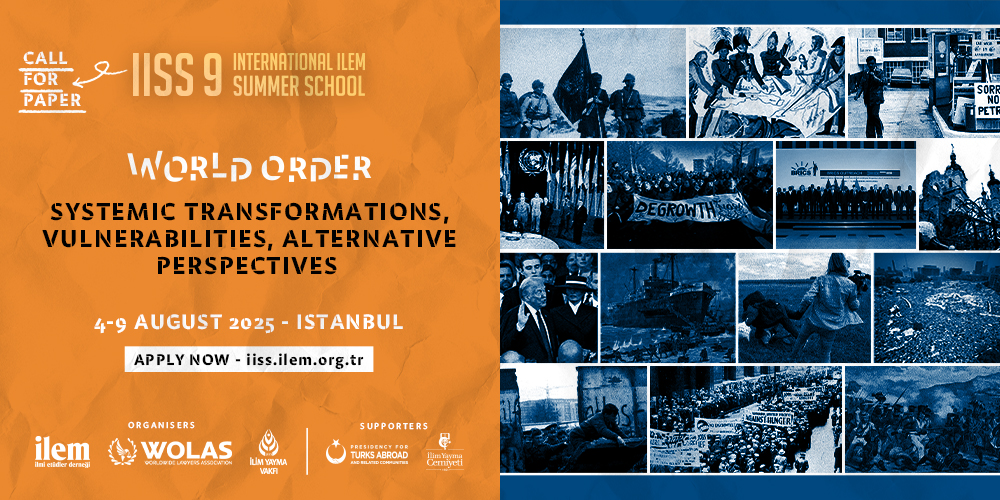
World Order: Systemic Transformations, Vulnerabilities, Alternative Perspectives
The biennial International ILEM Summer School aims to serve as a forum that brings together young academics and researchers from various disciplines to discuss significant issues concerning the world, particularly the Islamic world. The 9th International ILEM Summer School, planned for 2025, seeks to examine the current world order, addressing critical political, economic, social, and legal challenges while generating alternative solutions to systemic shortcomings.
In recent years, significant developments have shaken the global system, including political, social, and economic disruptions. The inability of international organizations, institutions, and actors to demonstrate sufficient resolve in addressing these issues has opened debates regarding the sustainability of the current system. Events such as the Russia-Ukraine War, the Iran-Israel conflict, the October 7 “Aqsa Flood,” and the ongoing genocide in Palestine are among the stark examples of these challenges. The United Nations’ inability to fulfill its founding mission, combined with Western actors’ strategies to maintain the status quo of the Western-centric political order, has exacerbated instability in many parts of the world.
The failure of global systems in addressing the Palestinian crisis, particularly the inability to enforce effective legal and political sanctions, has highlighted the deficiencies and vulnerabilities of the current order. Furthermore, Israel’s use of religious references to justify its foreign policy and regional aggression has brought the “ancient but renewed” significance of religion in the international system to the forefront, underscoring the urgent need for alternative approaches and inquiries.
Within this framework, the program will focus on three main themes:
1.World Order:
The historical development and contemporary structure of the international system will be analyzed within the context of “world order.” Discussions will cover the origins of the modern world order, the roles of global actors, and the impact of international institutions. By exploring the historical trajectory of the world order, the theme aims to understand the formation of current economic, political, legal, and social structures while evaluating the functionality of existing power dynamics and international mechanisms. Additionally, the transformative impact of technological advancements and emerging security threats on the global order will be examined.
2. Issues of the Order:
IISS – 9 will also address the economic, political, social, and legal issues caused or exacerbated by the global order. Topics include the dollar-centric global economy, income inequality, and the inequities of international trade, questioning the economic sustainability of the current system. Politically, the universality of democracy and the legitimacy of global political norms across different regions will be debated. Socially, the identity crises brought about by globalization, refugee crises, and rising nationalist movements will be discussed. In the legal domain, the applicability of international law norms, the failures of human rights regimes, and the ineffectiveness of responses to environmental challenges will be critically analyzed.
3.Alternative Paradigms: New Inquiries and Solutions
Alternative paradigms and solutions to address the limitations and inadequacies of the current system will be explored. The focus will be on designing a more just, inclusive, and sustainable global order from economic, political, social, and legal perspectives. Discussions will delve into new economic models, the quest for multi-centric political systems, social solidarity, and environmental sustainability. Proposals will also address updating and enhancing international law and human rights norms. These discussions will offer an opportunity to think deeply about how diverse cultural and regional approaches could contribute to global solutions outside the existing system.
Who Can Apply?
We are seeking submissions from PhD students and junior scholars in the related fields.
Is There a Fee To Participate in IISS?
IISS-9 is a free-of-charge event. Accommodation, meals, transportation (from accommodation location to ILEM), and social-cultural program expenses will be covered by IISS - 9 organiser and supporters. For Selected Papers, transportation support is being planned.
Important Dates
Extended Abstract Submission Deadline | June 15, 2025
Notification of Accepted Papers | June 30, 2025
Announcement of Summer School Program | July 15, 2025
Summer School | August 4- 9, 2025
Important Note:
Participants will only be able to submit extended abstracts. Applicants will not upload full texts before the congress. The full texts of the studies whose abstracts are accepted and presented at the congress will be uploaded to the system by the applicants after the congress to be published in the Congress Proceedings Book. The studies that are evaluated by the referees and deemed appropriate will be published in the Congress Proceedings Book.
Applicants should carefully review the following rules regarding the application process and writing rules and the congress calendar announced on iiss.ilem.org.tr.
The extended abstract should be submitted through the IISS Congress system and should be prepared in the range of 1000-1200 words, excluding the bibliography, by identifying 5 keywords. The abstract text must comply with the rules of English grammar and the bibliography must be shown. (A range of 100-400 words has been determined for the bibliography.) In the abstract texts; the basic thesis of the study, the methods and basic tools used in the study, the context and unique aspects of the study, the issues that the study is thought to contribute to the literature, and the findings and results of the study will be taken into consideration during the evaluation phase.
There should not be any information about the author anywhere in the abstract text submitted to the congress. If there is any information that will reveal the author of the text, the text will be eliminated without content review because it does not comply with the IISS blind review policy.
The extended abstract must be uploaded to the congress system until Juna 15, 2025.